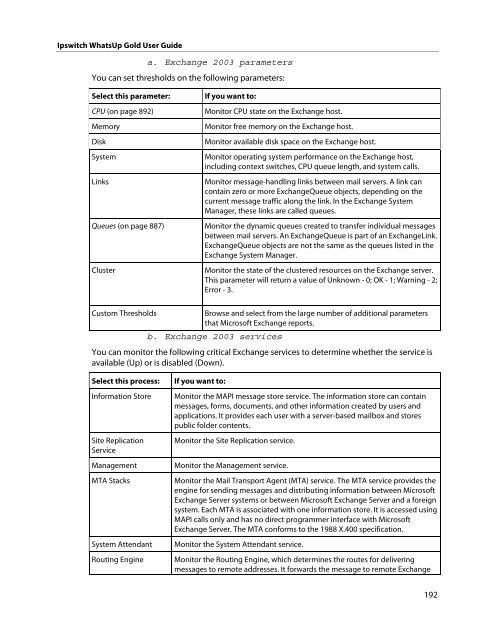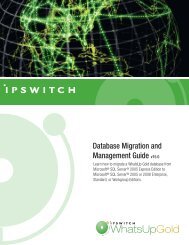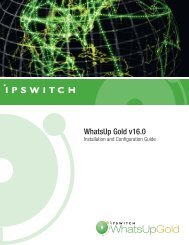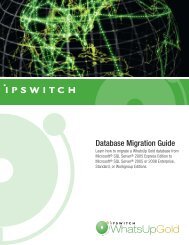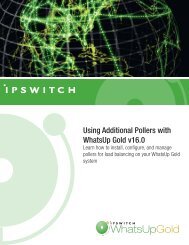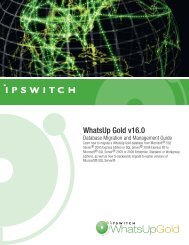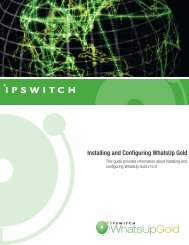- Page 1 and 2:
WhatsUpGold v15.0 User Guide
- Page 3 and 4:
Device Properties - Performance Mon
- Page 5 and 6:
Home Selecting or Creating an Actio
- Page 7 and 8:
Using WhatsUp Gold monitor reports.
- Page 9 and 10:
Alert Center Working with Alert Cen
- Page 11 and 12:
Admin Configure Disk Utilization ..
- Page 13 and 14:
Selecting a blackout period .......
- Page 15 and 16:
About Network Based Application Rec
- Page 17 and 18:
Other Plugins Using WhatsConfigured
- Page 19 and 20:
Ipswitch WhatsUp Gold User Guide Ac
- Page 21 and 22:
Ipswitch WhatsUp Gold User Guide Mo
- Page 23 and 24:
Ipswitch WhatsUp Gold User Guide Op
- Page 25 and 26:
Ipswitch WhatsUp Gold User Guide Fi
- Page 27 and 28:
Ipswitch WhatsUp Gold User Guide Re
- Page 29 and 30:
Ipswitch WhatsUp Gold User Guide D
- Page 31 and 32:
Ipswitch WhatsUp Gold User Guide T
- Page 33 and 34:
Ipswitch WhatsUp Gold User Guide I
- Page 35 and 36:
Using the WhatsUp Gold Console In T
- Page 37 and 38:
Ipswitch WhatsUp Gold User Guide Wh
- Page 39 and 40:
Ipswitch WhatsUp Gold User Guide 2
- Page 41 and 42:
Ipswitch WhatsUp Gold User Guide 4
- Page 43 and 44:
Ipswitch WhatsUp Gold User Guide .
- Page 45 and 46:
Ipswitch WhatsUp Gold User Guide Us
- Page 47 and 48:
Ipswitch WhatsUp Gold User Guide Th
- Page 49 and 50:
Ipswitch WhatsUp Gold User Guide Af
- Page 51 and 52:
Ipswitch WhatsUp Gold User Guide Cr
- Page 53 and 54:
Ipswitch WhatsUp Gold User Guide Co
- Page 55 and 56:
Ipswitch WhatsUp Gold User Guide U
- Page 57 and 58:
Ipswitch WhatsUp Gold User Guide De
- Page 59 and 60:
Ipswitch WhatsUp Gold User Guide To
- Page 61 and 62:
Ipswitch WhatsUp Gold User Guide Co
- Page 63 and 64:
Ipswitch WhatsUp Gold User Guide D
- Page 65 and 66:
Ipswitch WhatsUp Gold User Guide 4
- Page 67 and 68:
Ipswitch WhatsUp Gold User Guide D
- Page 69 and 70:
Ipswitch WhatsUp Gold User Guide Us
- Page 71 and 72:
Ipswitch WhatsUp Gold User Guide De
- Page 73 and 74:
Ipswitch WhatsUp Gold User Guide Re
- Page 75 and 76:
Ipswitch WhatsUp Gold User Guide To
- Page 77 and 78:
Ipswitch WhatsUp Gold User Guide Se
- Page 79 and 80:
Ipswitch WhatsUp Gold User Guide 2
- Page 81 and 82:
Ipswitch WhatsUp Gold User Guide De
- Page 83 and 84:
Ipswitch WhatsUp Gold User Guide To
- Page 85 and 86:
Ipswitch WhatsUp Gold User Guide FR
- Page 87 and 88:
Ipswitch WhatsUp Gold User Guide AN
- Page 89 and 90:
Ipswitch WhatsUp Gold User Guide To
- Page 91 and 92:
Ipswitch WhatsUp Gold User Guide To
- Page 93 and 94:
Ipswitch WhatsUp Gold User Guide 5
- Page 95 and 96:
Ipswitch WhatsUp Gold User Guide Gr
- Page 97 and 98:
Ipswitch WhatsUp Gold User Guide 2
- Page 99 and 100:
Ipswitch WhatsUp Gold User Guide Ad
- Page 101 and 102:
Ipswitch WhatsUp Gold User Guide No
- Page 103 and 104:
Ipswitch WhatsUp Gold User Guide 3
- Page 105 and 106:
Ipswitch WhatsUp Gold User Guide 2
- Page 107 and 108:
Ipswitch WhatsUp Gold User Guide Po
- Page 109 and 110:
Ipswitch WhatsUp Gold User Guide 3
- Page 111 and 112:
Ipswitch WhatsUp Gold User Guide Ex
- Page 113 and 114:
Ipswitch WhatsUp Gold User Guide Fo
- Page 115 and 116:
Ipswitch WhatsUp Gold User Guide an
- Page 117 and 118:
Ipswitch WhatsUp Gold User Guide 3
- Page 119 and 120:
Using Device Properties In This Cha
- Page 121 and 122:
Ipswitch WhatsUp Gold User Guide C
- Page 123 and 124:
Ipswitch WhatsUp Gold User Guide D
- Page 125 and 126:
Ipswitch WhatsUp Gold User Guide Th
- Page 127 and 128:
Ipswitch WhatsUp Gold User Guide S
- Page 129 and 130:
Ipswitch WhatsUp Gold User Guide Us
- Page 131 and 132:
Ipswitch WhatsUp Gold User Guide Us
- Page 133 and 134:
Ipswitch WhatsUp Gold User Guide 2
- Page 135 and 136:
Ipswitch WhatsUp Gold User Guide A
- Page 137 and 138:
Ipswitch WhatsUp Gold User Guide 2
- Page 139 and 140:
Ipswitch WhatsUp Gold User Guide No
- Page 141 and 142: Ipswitch WhatsUp Gold User Guide To
- Page 143 and 144: Ipswitch WhatsUp Gold User Guide T
- Page 145 and 146: Ipswitch WhatsUp Gold User Guide Us
- Page 147 and 148: Ipswitch WhatsUp Gold User Guide Se
- Page 149 and 150: Ipswitch WhatsUp Gold User Guide B
- Page 151 and 152: Ipswitch WhatsUp Gold User Guide To
- Page 153 and 154: Ipswitch WhatsUp Gold User Guide Us
- Page 155 and 156: Monitoring Devices In This Chapter
- Page 157 and 158: Ipswitch WhatsUp Gold User Guide Ab
- Page 159 and 160: Ipswitch WhatsUp Gold User Guide To
- Page 161 and 162: Ipswitch WhatsUp Gold User Guide 4
- Page 163 and 164: Ipswitch WhatsUp Gold User Guide Ex
- Page 165 and 166: Ipswitch WhatsUp Gold User Guide T
- Page 167 and 168: Ipswitch WhatsUp Gold User Guide H
- Page 169 and 170: Ipswitch WhatsUp Gold User Guide Ex
- Page 171 and 172: Ipswitch WhatsUp Gold User Guide Co
- Page 173 and 174: Ipswitch WhatsUp Gold User Guide :
- Page 175 and 176: Ipswitch WhatsUp Gold User Guide Me
- Page 177 and 178: Ipswitch WhatsUp Gold User Guide vi
- Page 179 and 180: Ipswitch WhatsUp Gold User Guide 5
- Page 181 and 182: Ipswitch WhatsUp Gold User Guide M
- Page 183 and 184: Ipswitch WhatsUp Gold User Guide No
- Page 185 and 186: Ipswitch WhatsUp Gold User Guide b)
- Page 187 and 188: Ipswitch WhatsUp Gold User Guide No
- Page 189 and 190: Ipswitch WhatsUp Gold User Guide Se
- Page 191: Ipswitch WhatsUp Gold User Guide Th
- Page 195 and 196: Ipswitch WhatsUp Gold User Guide c)
- Page 197 and 198: Ipswitch WhatsUp Gold User Guide g
- Page 199 and 200: Ipswitch WhatsUp Gold User Guide I
- Page 201 and 202: Ipswitch WhatsUp Gold User Guide U
- Page 203 and 204: Ipswitch WhatsUp Gold User Guide No
- Page 205 and 206: Ipswitch WhatsUp Gold User Guide 5
- Page 207 and 208: Ipswitch WhatsUp Gold User Guide 5
- Page 209 and 210: Ipswitch WhatsUp Gold User Guide No
- Page 211 and 212: Ipswitch WhatsUp Gold User Guide To
- Page 213 and 214: Ipswitch WhatsUp Gold User Guide To
- Page 215 and 216: Ipswitch WhatsUp Gold User Guide Wh
- Page 217 and 218: Ipswitch WhatsUp Gold User Guide a)
- Page 219 and 220: Ipswitch WhatsUp Gold User Guide Se
- Page 221 and 222: Ipswitch WhatsUp Gold User Guide 4
- Page 223 and 224: Ipswitch WhatsUp Gold User Guide To
- Page 225 and 226: Ipswitch WhatsUp Gold User Guide g)
- Page 227 and 228: Ipswitch WhatsUp Gold User Guide S
- Page 229 and 230: Ipswitch WhatsUp Gold User Guide xx
- Page 231 and 232: Ipswitch WhatsUp Gold User Guide 3
- Page 233 and 234: Passive Monitor Library In This Cha
- Page 235 and 236: Ipswitch WhatsUp Gold User Guide SN
- Page 237 and 238: Ipswitch WhatsUp Gold User Guide 2
- Page 239 and 240: Ipswitch WhatsUp Gold User Guide 4
- Page 241 and 242: Ipswitch WhatsUp Gold User Guide Us
- Page 243 and 244:
Ipswitch WhatsUp Gold User Guide xx
- Page 245 and 246:
Ipswitch WhatsUp Gold User Guide No
- Page 247 and 248:
Using Performance Monitors In This
- Page 249 and 250:
Ipswitch WhatsUp Gold User Guide Ca
- Page 251 and 252:
Ipswitch WhatsUp Gold User Guide 5
- Page 253 and 254:
Ipswitch WhatsUp Gold User Guide 5
- Page 255 and 256:
Ipswitch WhatsUp Gold User Guide Tr
- Page 257 and 258:
Ipswitch WhatsUp Gold User Guide Co
- Page 259 and 260:
Ipswitch WhatsUp Gold User Guide Co
- Page 261 and 262:
Ipswitch WhatsUp Gold User Guide Yo
- Page 263 and 264:
Ipswitch WhatsUp Gold User Guide 5
- Page 265 and 266:
Ipswitch WhatsUp Gold User Guide Im
- Page 267 and 268:
Ipswitch WhatsUp Gold User Guide Cr
- Page 269 and 270:
Ipswitch WhatsUp Gold User Guide Ex
- Page 271 and 272:
Ipswitch WhatsUp Gold User Guide Us
- Page 273 and 274:
Ipswitch WhatsUp Gold User Guide Fo
- Page 275 and 276:
Ipswitch WhatsUp Gold User Guide Co
- Page 277 and 278:
Ipswitch WhatsUp Gold User Guide lo
- Page 279 and 280:
Ipswitch WhatsUp Gold User Guide M
- Page 281 and 282:
Ipswitch WhatsUp Gold User Guide No
- Page 283 and 284:
Ipswitch WhatsUp Gold User Guide Re
- Page 285 and 286:
Ipswitch WhatsUp Gold User Guide S
- Page 287 and 288:
Ipswitch WhatsUp Gold User Guide Th
- Page 289 and 290:
Ipswitch WhatsUp Gold User Guide Ad
- Page 291 and 292:
Ipswitch WhatsUp Gold User Guide S
- Page 293 and 294:
Ipswitch WhatsUp Gold User Guide 3
- Page 295 and 296:
Ipswitch WhatsUp Gold User Guide Ac
- Page 297 and 298:
Ipswitch WhatsUp Gold User Guide Sy
- Page 299 and 300:
Ipswitch WhatsUp Gold User Guide 5
- Page 301 and 302:
Ipswitch WhatsUp Gold User Guide Cr
- Page 303 and 304:
Ipswitch WhatsUp Gold User Guide To
- Page 305 and 306:
Ipswitch WhatsUp Gold User Guide h)
- Page 307 and 308:
Ipswitch WhatsUp Gold User Guide Us
- Page 309 and 310:
Ipswitch WhatsUp Gold User Guide I
- Page 311 and 312:
Ipswitch WhatsUp Gold User Guide Pa
- Page 313 and 314:
Ipswitch WhatsUp Gold User Guide De
- Page 315 and 316:
Ipswitch WhatsUp Gold User Guide Va
- Page 317 and 318:
Ipswitch WhatsUp Gold User Guide e
- Page 319 and 320:
Ipswitch WhatsUp Gold User Guide T
- Page 321 and 322:
Ipswitch WhatsUp Gold User Guide L
- Page 323 and 324:
Ipswitch WhatsUp Gold User Guide P
- Page 325 and 326:
Ipswitch WhatsUp Gold User Guide M
- Page 327 and 328:
Ipswitch WhatsUp Gold User Guide U
- Page 329 and 330:
Ipswitch WhatsUp Gold User Guide Bu
- Page 331 and 332:
Ipswitch WhatsUp Gold User Guide Bu
- Page 333 and 334:
Ipswitch WhatsUp Gold User Guide Bu
- Page 335 and 336:
Ipswitch WhatsUp Gold User Guide Ma
- Page 337 and 338:
Ipswitch WhatsUp Gold User Guide Se
- Page 339 and 340:
Home In This Chapter Understanding
- Page 341 and 342:
Ipswitch WhatsUp Gold User Guide Ch
- Page 343 and 344:
Ipswitch WhatsUp Gold User Guide Da
- Page 345 and 346:
Ipswitch WhatsUp Gold User Guide 5
- Page 347 and 348:
Ipswitch WhatsUp Gold User Guide Wo
- Page 349 and 350:
Ipswitch WhatsUp Gold User Guide To
- Page 351 and 352:
Ipswitch WhatsUp Gold User Guide Mo
- Page 353 and 354:
Types of dashboards In This Chapter
- Page 355 and 356:
Ipswitch WhatsUp Gold User Guide Yo
- Page 357 and 358:
Ipswitch WhatsUp Gold User Guide To
- Page 359 and 360:
Using Favorites In This Chapter Usi
- Page 361 and 362:
Ipswitch WhatsUp Gold User Guide Ed
- Page 363 and 364:
Dashboard reports In This Chapter C
- Page 365 and 366:
Ipswitch WhatsUp Gold User Guide CP
- Page 367 and 368:
Ipswitch WhatsUp Gold User Guide La
- Page 369 and 370:
Ipswitch WhatsUp Gold User Guide To
- Page 371 and 372:
Ipswitch WhatsUp Gold User Guide Cu
- Page 373 and 374:
Ipswitch WhatsUp Gold User Guide La
- Page 375 and 376:
Disk Utilization reports In This Ch
- Page 377 and 378:
Ipswitch WhatsUp Gold User Guide V
- Page 379 and 380:
Ipswitch WhatsUp Gold User Guide Al
- Page 381 and 382:
Ipswitch WhatsUp Gold User Guide Y
- Page 383 and 384:
Flow Monitor reports In This Chapte
- Page 385 and 386:
Ipswitch WhatsUp Gold User Guide Th
- Page 387 and 388:
Ipswitch WhatsUp Gold User Guide In
- Page 389 and 390:
Ipswitch WhatsUp Gold User Guide In
- Page 391 and 392:
Ipswitch WhatsUp Gold User Guide Fo
- Page 393 and 394:
Ipswitch WhatsUp Gold User Guide Fo
- Page 395 and 396:
Ipswitch WhatsUp Gold User Guide Fl
- Page 397 and 398:
Ipswitch WhatsUp Gold User Guide In
- Page 399 and 400:
Ipswitch WhatsUp Gold User Guide P
- Page 401 and 402:
Ipswitch WhatsUp Gold User Guide Yo
- Page 403 and 404:
Ipswitch WhatsUp Gold User Guide In
- Page 405 and 406:
Ipswitch WhatsUp Gold User Guide Yo
- Page 407 and 408:
Ipswitch WhatsUp Gold User Guide In
- Page 409 and 410:
Ipswitch WhatsUp Gold User Guide Ge
- Page 411 and 412:
Ipswitch WhatsUp Gold User Guide To
- Page 413 and 414:
Ipswitch WhatsUp Gold User Guide Ge
- Page 415 and 416:
Ipswitch WhatsUp Gold User Guide Ge
- Page 417 and 418:
Ipswitch WhatsUp Gold User Guide 2
- Page 419 and 420:
Ipswitch WhatsUp Gold User Guide Re
- Page 421 and 422:
Ipswitch WhatsUp Gold User Guide To
- Page 423 and 424:
Ipswitch WhatsUp Gold User Guide To
- Page 425 and 426:
Ipswitch WhatsUp Gold User Guide In
- Page 427 and 428:
Ipswitch WhatsUp Gold User Guide In
- Page 429 and 430:
Ipswitch WhatsUp Gold User Guide In
- Page 431 and 432:
Ipswitch WhatsUp Gold User Guide To
- Page 433 and 434:
Ipswitch WhatsUp Gold User Guide In
- Page 435 and 436:
Ipswitch WhatsUp Gold User Guide In
- Page 437 and 438:
Ipswitch WhatsUp Gold User Guide G
- Page 439 and 440:
Ipswitch WhatsUp Gold User Guide Th
- Page 441 and 442:
Ipswitch WhatsUp Gold User Guide Th
- Page 443 and 444:
Ipswitch WhatsUp Gold User Guide To
- Page 445 and 446:
Ipswitch WhatsUp Gold User Guide To
- Page 447 and 448:
Ipswitch WhatsUp Gold User Guide Me
- Page 449 and 450:
Ipswitch WhatsUp Gold User Guide La
- Page 451 and 452:
Ipswitch WhatsUp Gold User Guide Ea
- Page 453 and 454:
Ipswitch WhatsUp Gold User Guide Pe
- Page 455 and 456:
Ipswitch WhatsUp Gold User Guide M
- Page 457 and 458:
Ipswitch WhatsUp Gold User Guide Cu
- Page 459 and 460:
Ipswitch WhatsUp Gold User Guide D
- Page 461 and 462:
Ipswitch WhatsUp Gold User Guide In
- Page 463 and 464:
Ipswitch WhatsUp Gold User Guide In
- Page 465 and 466:
Ipswitch WhatsUp Gold User Guide In
- Page 467 and 468:
Ipswitch WhatsUp Gold User Guide G
- Page 469 and 470:
Ipswitch WhatsUp Gold User Guide D
- Page 471 and 472:
Ipswitch WhatsUp Gold User Guide Pe
- Page 473 and 474:
Ipswitch WhatsUp Gold User Guide P
- Page 475 and 476:
Ipswitch WhatsUp Gold User Guide To
- Page 477 and 478:
Ipswitch WhatsUp Gold User Guide La
- Page 479 and 480:
Ipswitch WhatsUp Gold User Guide To
- Page 481 and 482:
Ipswitch WhatsUp Gold User Guide M
- Page 483 and 484:
Ipswitch WhatsUp Gold User Guide Pi
- Page 485 and 486:
Ipswitch WhatsUp Gold User Guide T
- Page 487 and 488:
Ipswitch WhatsUp Gold User Guide 3
- Page 489 and 490:
Ipswitch WhatsUp Gold User Guide No
- Page 491 and 492:
Ipswitch WhatsUp Gold User Guide Pr
- Page 493 and 494:
Ipswitch WhatsUp Gold User Guide Pr
- Page 495 and 496:
Ipswitch WhatsUp Gold User Guide Pr
- Page 497 and 498:
Ipswitch WhatsUp Gold User Guide To
- Page 499 and 500:
Ipswitch WhatsUp Gold User Guide S
- Page 501 and 502:
Ipswitch WhatsUp Gold User Guide 2
- Page 503 and 504:
Ipswitch WhatsUp Gold User Guide Pr
- Page 505 and 506:
Ipswitch WhatsUp Gold User Guide No
- Page 507 and 508:
Ipswitch WhatsUp Gold User Guide P
- Page 509 and 510:
Ipswitch WhatsUp Gold User Guide ..
- Page 511 and 512:
Ipswitch WhatsUp Gold User Guide Re
- Page 513 and 514:
Ipswitch WhatsUp Gold User Guide C
- Page 515 and 516:
Ipswitch WhatsUp Gold User Guide D
- Page 517 and 518:
Ipswitch WhatsUp Gold User Guide 2
- Page 519 and 520:
Ipswitch WhatsUp Gold User Guide Fo
- Page 521 and 522:
Ipswitch WhatsUp Gold User Guide C
- Page 523 and 524:
Ipswitch WhatsUp Gold User Guide M
- Page 525 and 526:
Ipswitch WhatsUp Gold User Guide D
- Page 527 and 528:
Ipswitch WhatsUp Gold User Guide S
- Page 529 and 530:
Ipswitch WhatsUp Gold User Guide To
- Page 531 and 532:
Ipswitch WhatsUp Gold User Guide To
- Page 533 and 534:
Ipswitch WhatsUp Gold User Guide To
- Page 535 and 536:
Ipswitch WhatsUp Gold User Guide D
- Page 537 and 538:
Split Second Graph reports In This
- Page 539 and 540:
Ipswitch WhatsUp Gold User Guide No
- Page 541 and 542:
Ipswitch WhatsUp Gold User Guide Sp
- Page 543 and 544:
Ipswitch WhatsUp Gold User Guide A
- Page 545 and 546:
Ipswitch WhatsUp Gold User Guide Sp
- Page 547 and 548:
Ipswitch WhatsUp Gold User Guide R
- Page 549 and 550:
Ipswitch WhatsUp Gold User Guide No
- Page 551 and 552:
Ipswitch WhatsUp Gold User Guide No
- Page 553 and 554:
Threshold reports In This Chapter T
- Page 555 and 556:
Ipswitch WhatsUp Gold User Guide Th
- Page 557 and 558:
Ipswitch WhatsUp Gold User Guide To
- Page 559 and 560:
Ipswitch WhatsUp Gold User Guide Ea
- Page 561 and 562:
Ipswitch WhatsUp Gold User Guide M
- Page 563 and 564:
Ipswitch WhatsUp Gold User Guide To
- Page 565 and 566:
Ipswitch WhatsUp Gold User Guide To
- Page 567 and 568:
Ipswitch WhatsUp Gold User Guide To
- Page 569 and 570:
Ipswitch WhatsUp Gold User Guide 2
- Page 571 and 572:
Virtualization reports In This Chap
- Page 573 and 574:
Ipswitch WhatsUp Gold User Guide Vi
- Page 575 and 576:
Ipswitch WhatsUp Gold User Guide Vi
- Page 577 and 578:
Ipswitch WhatsUp Gold User Guide P
- Page 579 and 580:
Ipswitch WhatsUp Gold User Guide N
- Page 581 and 582:
Ipswitch WhatsUp Gold User Guide M
- Page 583 and 584:
Ipswitch WhatsUp Gold User Guide W
- Page 585 and 586:
Ipswitch WhatsUp Gold User Guide To
- Page 587 and 588:
Ipswitch WhatsUp Gold User Guide Th
- Page 589 and 590:
Ipswitch WhatsUp Gold User Guide To
- Page 591 and 592:
Ipswitch WhatsUp Gold User Guide Th
- Page 593 and 594:
Working with monitor reports In Thi
- Page 595 and 596:
Ipswitch WhatsUp Gold User Guide 4
- Page 597 and 598:
Ipswitch WhatsUp Gold User Guide 4
- Page 599 and 600:
Ipswitch WhatsUp Gold User Guide Zo
- Page 601 and 602:
Ipswitch WhatsUp Gold User Guide Vi
- Page 603 and 604:
Ipswitch WhatsUp Gold User Guide To
- Page 605 and 606:
Ipswitch WhatsUp Gold User Guide Us
- Page 607 and 608:
Ipswitch WhatsUp Gold User Guide Us
- Page 609 and 610:
Ipswitch WhatsUp Gold User Guide Mo
- Page 611 and 612:
Ipswitch WhatsUp Gold User Guide Un
- Page 613 and 614:
Using Favorites Using the Favorites
- Page 615 and 616:
Ipswitch WhatsUp Gold User Guide Ed
- Page 617 and 618:
Using WhatsUp Gold monitor reports
- Page 619 and 620:
Ipswitch WhatsUp Gold User Guide Na
- Page 621 and 622:
Ipswitch WhatsUp Gold User Guide Yo
- Page 623 and 624:
Ipswitch WhatsUp Gold User Guide T
- Page 625 and 626:
Ipswitch WhatsUp Gold User Guide Us
- Page 627 and 628:
Ipswitch WhatsUp Gold User Guide U
- Page 629 and 630:
Ipswitch WhatsUp Gold User Guide 7
- Page 631 and 632:
Performance monitor reports In This
- Page 633 and 634:
Ipswitch WhatsUp Gold User Guide Mo
- Page 635 and 636:
Ipswitch WhatsUp Gold User Guide De
- Page 637 and 638:
Ipswitch WhatsUp Gold User Guide No
- Page 639 and 640:
Ipswitch WhatsUp Gold User Guide Wh
- Page 641 and 642:
Ipswitch WhatsUp Gold User Guide Mo
- Page 643 and 644:
Ipswitch WhatsUp Gold User Guide In
- Page 645 and 646:
Ipswitch WhatsUp Gold User Guide R
- Page 647 and 648:
Ipswitch WhatsUp Gold User Guide Sp
- Page 649 and 650:
Ipswitch WhatsUp Gold User Guide De
- Page 651 and 652:
Ipswitch WhatsUp Gold User Guide Yo
- Page 653 and 654:
Ipswitch WhatsUp Gold User Guide P
- Page 655 and 656:
Ipswitch WhatsUp Gold User Guide In
- Page 657 and 658:
Ipswitch WhatsUp Gold User Guide R
- Page 659 and 660:
Ipswitch WhatsUp Gold User Guide A
- Page 661 and 662:
Ipswitch WhatsUp Gold User Guide De
- Page 663 and 664:
Ipswitch WhatsUp Gold User Guide Ac
- Page 665 and 666:
Ipswitch WhatsUp Gold User Guide M
- Page 667 and 668:
Ipswitch WhatsUp Gold User Guide Vi
- Page 669 and 670:
Ipswitch WhatsUp Gold User Guide D
- Page 671 and 672:
Ipswitch WhatsUp Gold User Guide C
- Page 673 and 674:
Ipswitch WhatsUp Gold User Guide No
- Page 675 and 676:
Ipswitch WhatsUp Gold User Guide De
- Page 677 and 678:
Working with logs In This Chapter L
- Page 679 and 680:
Ipswitch WhatsUp Gold User Guide Ch
- Page 681 and 682:
Ipswitch WhatsUp Gold User Guide Na
- Page 683 and 684:
Ipswitch WhatsUp Gold User Guide Ma
- Page 685 and 686:
Ipswitch WhatsUp Gold User Guide Ch
- Page 687 and 688:
Using WhatsUp Gold System Logs In T
- Page 689 and 690:
Error Logs In This Chapter General
- Page 691 and 692:
Ipswitch WhatsUp Gold User Guide Pa
- Page 693 and 694:
Ipswitch WhatsUp Gold User Guide SN
- Page 695 and 696:
Ipswitch WhatsUp Gold User Guide Sy
- Page 697 and 698:
Ipswitch WhatsUp Gold User Guide Wi
- Page 699 and 700:
Ipswitch WhatsUp Gold User Guide Ac
- Page 701 and 702:
Ipswitch WhatsUp Gold User Guide No
- Page 703 and 704:
Ipswitch WhatsUp Gold User Guide C
- Page 705 and 706:
Using WhatsUp Gold Group / Device L
- Page 707 and 708:
Ipswitch WhatsUp Gold User Guide T
- Page 709 and 710:
Ipswitch WhatsUp Gold User Guide Lo
- Page 711 and 712:
Ipswitch WhatsUp Gold User Guide D
- Page 713 and 714:
Alert Center In This Chapter Workin
- Page 715 and 716:
Ipswitch WhatsUp Gold User Guide To
- Page 717 and 718:
Ipswitch WhatsUp Gold User Guide To
- Page 719 and 720:
Ipswitch WhatsUp Gold User Guide Sc
- Page 721 and 722:
Using the Alerts Home reports In Th
- Page 723 and 724:
Ipswitch WhatsUp Gold User Guide D
- Page 725 and 726:
Ipswitch WhatsUp Gold User Guide Us
- Page 727 and 728:
Ipswitch WhatsUp Gold User Guide Us
- Page 729 and 730:
Ipswitch WhatsUp Gold User Guide Us
- Page 731 and 732:
Ipswitch WhatsUp Gold User Guide Wh
- Page 733 and 734:
Ipswitch WhatsUp Gold User Guide Wh
- Page 735 and 736:
Ipswitch WhatsUp Gold User Guide 2
- Page 737 and 738:
Ipswitch WhatsUp Gold User Guide 6
- Page 739 and 740:
Ipswitch WhatsUp Gold User Guide A
- Page 741 and 742:
Ipswitch WhatsUp Gold User Guide No
- Page 743 and 744:
Ipswitch WhatsUp Gold User Guide No
- Page 745 and 746:
Ipswitch WhatsUp Gold User Guide St
- Page 747 and 748:
Ipswitch WhatsUp Gold User Guide Us
- Page 749 and 750:
Ipswitch WhatsUp Gold User Guide Co
- Page 751 and 752:
Ipswitch WhatsUp Gold User Guide 4
- Page 753 and 754:
Ipswitch WhatsUp Gold User Guide Ti
- Page 755 and 756:
Ipswitch WhatsUp Gold User Guide Co
- Page 757 and 758:
Ipswitch WhatsUp Gold User Guide Co
- Page 759 and 760:
Ipswitch WhatsUp Gold User Guide Co
- Page 761 and 762:
Ipswitch WhatsUp Gold User Guide Co
- Page 763 and 764:
Ipswitch WhatsUp Gold User Guide Co
- Page 765 and 766:
Ipswitch WhatsUp Gold User Guide Co
- Page 767 and 768:
Ipswitch WhatsUp Gold User Guide Co
- Page 769 and 770:
Ipswitch WhatsUp Gold User Guide Co
- Page 771 and 772:
Configuring passive thresholds In T
- Page 773 and 774:
Ipswitch WhatsUp Gold User Guide N
- Page 775 and 776:
Ipswitch WhatsUp Gold User Guide N
- Page 777 and 778:
Ipswitch WhatsUp Gold User Guide D
- Page 779 and 780:
Ipswitch WhatsUp Gold User Guide 3
- Page 781 and 782:
Ipswitch WhatsUp Gold User Guide Co
- Page 783 and 784:
Ipswitch WhatsUp Gold User Guide Co
- Page 785 and 786:
Ipswitch WhatsUp Gold User Guide Co
- Page 787 and 788:
Ipswitch WhatsUp Gold User Guide Co
- Page 789 and 790:
Ipswitch WhatsUp Gold User Guide Co
- Page 791 and 792:
Configuring system thresholds In Th
- Page 793 and 794:
Ipswitch WhatsUp Gold User Guide T
- Page 795 and 796:
Ipswitch WhatsUp Gold User Guide Co
- Page 797 and 798:
Ipswitch WhatsUp Gold User Guide 5
- Page 799 and 800:
Ipswitch WhatsUp Gold User Guide 9
- Page 801 and 802:
Ipswitch WhatsUp Gold User Guide Th
- Page 803 and 804:
Ipswitch WhatsUp Gold User Guide 3
- Page 805 and 806:
Ipswitch WhatsUp Gold User Guide Re
- Page 807 and 808:
Ipswitch WhatsUp Gold User Guide If
- Page 809 and 810:
Ipswitch WhatsUp Gold User Guide En
- Page 811 and 812:
Ipswitch WhatsUp Gold User Guide Tr
- Page 813 and 814:
Ipswitch WhatsUp Gold User Guide To
- Page 815 and 816:
Ipswitch WhatsUp Gold User Guide Re
- Page 817 and 818:
Ipswitch WhatsUp Gold User Guide P
- Page 819 and 820:
Ipswitch WhatsUp Gold User Guide I
- Page 821 and 822:
Ipswitch WhatsUp Gold User Guide No
- Page 823 and 824:
Ipswitch WhatsUp Gold User Guide i
- Page 825 and 826:
Ipswitch WhatsUp Gold User Guide i
- Page 827 and 828:
Ipswitch WhatsUp Gold User Guide T
- Page 829 and 830:
Ipswitch WhatsUp Gold User Guide 2.
- Page 831 and 832:
Ipswitch WhatsUp Gold User Guide D
- Page 833 and 834:
Using WhatsUp Gold Admin features I
- Page 835 and 836:
Home In This Chapter Using Admin Co
- Page 837 and 838:
Ipswitch WhatsUp Gold User Guide Us
- Page 839 and 840:
Ipswitch WhatsUp Gold User Guide S
- Page 841 and 842:
Ipswitch WhatsUp Gold User Guide P
- Page 843 and 844:
Scheduled In This Chapter Adding an
- Page 845 and 846:
Ipswitch WhatsUp Gold User Guide To
- Page 847 and 848:
Ipswitch WhatsUp Gold User Guide No
- Page 849 and 850:
Ipswitch WhatsUp Gold User Guide To
- Page 851 and 852:
Ipswitch WhatsUp Gold User Guide 8
- Page 853 and 854:
Managing users and groups In This C
- Page 855 and 856:
Ipswitch WhatsUp Gold User Guide To
- Page 857 and 858:
Ipswitch WhatsUp Gold User Guide Ac
- Page 859 and 860:
Ipswitch WhatsUp Gold User Guide Ti
- Page 861 and 862:
Ipswitch WhatsUp Gold User Guide C
- Page 863 and 864:
Ipswitch WhatsUp Gold User Guide Fr
- Page 865 and 866:
Ipswitch WhatsUp Gold User Guide Fo
- Page 867 and 868:
Ipswitch WhatsUp Gold User Guide Co
- Page 869 and 870:
Ipswitch WhatsUp Gold User Guide We
- Page 871 and 872:
Ipswitch WhatsUp Gold User Guide 3
- Page 873 and 874:
Ipswitch WhatsUp Gold User Guide En
- Page 875 and 876:
Ipswitch WhatsUp Gold User Guide 5
- Page 877 and 878:
Ipswitch WhatsUp Gold User Guide No
- Page 879 and 880:
Ipswitch WhatsUp Gold User Guide Pa
- Page 881 and 882:
Using the WhatsUp Services Controll
- Page 883 and 884:
Ipswitch WhatsUp Gold User Guide U
- Page 885 and 886:
Ipswitch WhatsUp Gold User Guide WM
- Page 887 and 888:
Ipswitch WhatsUp Gold User Guide Co
- Page 889 and 890:
Ipswitch WhatsUp Gold User Guide Co
- Page 891 and 892:
Ipswitch WhatsUp Gold User Guide T
- Page 893 and 894:
Ipswitch WhatsUp Gold User Guide R
- Page 895 and 896:
Ipswitch WhatsUp Gold User Guide T
- Page 897 and 898:
Ipswitch WhatsUp Gold User Guide Se
- Page 899 and 900:
Using SNMP Features In This Chapter
- Page 901 and 902:
Ipswitch WhatsUp Gold User Guide 4
- Page 903 and 904:
Ipswitch WhatsUp Gold User Guide To
- Page 905 and 906:
Ipswitch WhatsUp Gold User Guide To
- Page 907 and 908:
Ipswitch WhatsUp Gold User Guide Ci
- Page 909 and 910:
Ipswitch WhatsUp Gold User Guide Ab
- Page 911 and 912:
Ipswitch WhatsUp Gold User Guide No
- Page 913 and 914:
Ipswitch WhatsUp Gold User Guide Ge
- Page 915 and 916:
Ipswitch WhatsUp Gold User Guide Ru
- Page 917 and 918:
Ipswitch WhatsUp Gold User Guide De
- Page 919 and 920:
Ipswitch WhatsUp Gold User Guide En
- Page 921 and 922:
Ipswitch WhatsUp Gold User Guide Fo
- Page 923 and 924:
Ipswitch WhatsUp Gold User Guide }
- Page 925 and 926:
Ipswitch WhatsUp Gold User Guide {
- Page 927 and 928:
Ipswitch WhatsUp Gold User Guide }
- Page 929 and 930:
Ipswitch WhatsUp Gold User Guide Ke
- Page 931 and 932:
Ipswitch WhatsUp Gold User Guide Ge
- Page 933 and 934:
Ipswitch WhatsUp Gold User Guide if
- Page 935 and 936:
Ipswitch WhatsUp Gold User Guide }
- Page 937 and 938:
Ipswitch WhatsUp Gold User Guide }
- Page 939 and 940:
Ipswitch WhatsUp Gold User Guide No
- Page 941 and 942:
Ipswitch WhatsUp Gold User Guide Po
- Page 943 and 944:
Using the SNMP API The WhatsUp Gold
- Page 945 and 946:
Ipswitch WhatsUp Gold User Guide Me
- Page 947 and 948:
Ipswitch WhatsUp Gold User Guide
- Page 949 and 950:
Ipswitch WhatsUp Gold User Guide Wa
- Page 951 and 952:
Ipswitch WhatsUp Gold User Guide Th
- Page 953 and 954:
Ipswitch WhatsUp Gold User Guide B
- Page 955 and 956:
Ipswitch WhatsUp Gold User Guide T
- Page 957 and 958:
Ipswitch WhatsUp Gold User Guide Co
- Page 959 and 960:
Ipswitch WhatsUp Gold User Guide Tr
- Page 961 and 962:
Ipswitch WhatsUp Gold User Guide To
- Page 963 and 964:
Ipswitch WhatsUp Gold User Guide Tr
- Page 965 and 966:
Flow Monitor Overview In This Chapt
- Page 967 and 968:
Ipswitch WhatsUp Gold User Guide Ho
- Page 969 and 970:
Ipswitch WhatsUp Gold User Guide Fl
- Page 971 and 972:
Ipswitch WhatsUp Gold User Guide So
- Page 973 and 974:
Preparing network devices In This C
- Page 975 and 976:
Ipswitch WhatsUp Gold User Guide To
- Page 977 and 978:
Ipswitch WhatsUp Gold User Guide Co
- Page 979 and 980:
Ipswitch WhatsUp Gold User Guide No
- Page 981 and 982:
Ipswitch WhatsUp Gold User Guide T
- Page 983 and 984:
Ipswitch WhatsUp Gold User Guide 6
- Page 985 and 986:
Ipswitch WhatsUp Gold User Guide Ab
- Page 987 and 988:
Ipswitch WhatsUp Gold User Guide To
- Page 989 and 990:
Ipswitch WhatsUp Gold User Guide Vi
- Page 991 and 992:
Ipswitch WhatsUp Gold User Guide En
- Page 993 and 994:
Managing Flow Sources In This Chapt
- Page 995 and 996:
Ipswitch WhatsUp Gold User Guide To
- Page 997 and 998:
Ipswitch WhatsUp Gold User Guide Co
- Page 999 and 1000:
Ipswitch WhatsUp Gold User Guide No
- Page 1001 and 1002:
Ipswitch WhatsUp Gold User Guide 4
- Page 1003 and 1004:
Ipswitch WhatsUp Gold User Guide Co
- Page 1005 and 1006:
Ipswitch WhatsUp Gold User Guide Cr
- Page 1007 and 1008:
Managing Flow Monitor Settings In T
- Page 1009 and 1010:
Ipswitch WhatsUp Gold User Guide R
- Page 1011 and 1012:
Ipswitch WhatsUp Gold User Guide R
- Page 1013 and 1014:
Ipswitch WhatsUp Gold User Guide 2
- Page 1015 and 1016:
Ipswitch WhatsUp Gold User Guide Us
- Page 1017 and 1018:
Ipswitch WhatsUp Gold User Guide P
- Page 1019 and 1020:
Configuring Applications In This Ch
- Page 1021 and 1022:
Ipswitch WhatsUp Gold User Guide Th
- Page 1023 and 1024:
Configuring Flow Groups In This Cha
- Page 1025 and 1026:
Ipswitch WhatsUp Gold User Guide Ti
- Page 1027 and 1028:
Ipswitch WhatsUp Gold User Guide Ed
- Page 1029 and 1030:
Ipswitch WhatsUp Gold User Guide 3
- Page 1031 and 1032:
Configuring Data Export Settings In
- Page 1033 and 1034:
Maintaining Flow Databases In This
- Page 1035 and 1036:
Ipswitch WhatsUp Gold User Guide P
- Page 1037 and 1038:
Ipswitch WhatsUp Gold User Guide Im
- Page 1039 and 1040:
Using Flow Monitor reports In This
- Page 1041 and 1042:
Ipswitch WhatsUp Gold User Guide No
- Page 1043 and 1044:
Ipswitch WhatsUp Gold User Guide F
- Page 1045 and 1046:
Ipswitch WhatsUp Gold User Guide To
- Page 1047 and 1048:
Ipswitch WhatsUp Gold User Guide Yo
- Page 1049 and 1050:
Ipswitch WhatsUp Gold User Guide Se
- Page 1051 and 1052:
Ipswitch WhatsUp Gold User Guide Co
- Page 1053 and 1054:
Ipswitch WhatsUp Gold User Guide Fl
- Page 1055 and 1056:
Ipswitch WhatsUp Gold User Guide Fi
- Page 1057 and 1058:
Ipswitch WhatsUp Gold User Guide Fl
- Page 1059 and 1060:
Ipswitch WhatsUp Gold User Guide Fi
- Page 1061 and 1062:
Ipswitch WhatsUp Gold User Guide O
- Page 1063 and 1064:
Ipswitch WhatsUp Gold User Guide F
- Page 1065 and 1066:
Ipswitch WhatsUp Gold User Guide Us
- Page 1067 and 1068:
Using Flow Monitor dashboard report
- Page 1069 and 1070:
Ipswitch WhatsUp Gold User Guide If
- Page 1071 and 1072:
Ipswitch WhatsUp Gold User Guide Fo
- Page 1073 and 1074:
Ipswitch WhatsUp Gold User Guide Us
- Page 1075 and 1076:
Ipswitch WhatsUp Gold User Guide M
- Page 1077 and 1078:
Ipswitch WhatsUp Gold User Guide T
- Page 1079 and 1080:
Ipswitch WhatsUp Gold User Guide Li
- Page 1081 and 1082:
Welcome to Ipswitch WhatsVirtual In
- Page 1083 and 1084:
Ipswitch WhatsUp Gold User Guide R
- Page 1085 and 1086:
Ipswitch WhatsUp Gold User Guide Cr
- Page 1087 and 1088:
Ipswitch WhatsUp Gold User Guide Vi
- Page 1089 and 1090:
Ipswitch WhatsUp Gold User Guide Pe
- Page 1091 and 1092:
Ipswitch WhatsUp Gold User Guide Yo
- Page 1093 and 1094:
Ipswitch WhatsUp Gold User Guide Us
- Page 1095 and 1096:
Ipswitch WhatsUp Gold User Guide To
- Page 1097 and 1098:
Ipswitch WhatsUp Gold User Guide To
- Page 1099 and 1100:
Ipswitch WhatsUp Gold User Guide 3
- Page 1101 and 1102:
Ipswitch WhatsUp Gold User Guide Co
- Page 1103 and 1104:
Using WhatsConfigured In This Chapt
- Page 1105 and 1106:
Accessing WhatsConfigured Features
- Page 1107 and 1108:
Ipswitch WhatsUp Gold User Guide Fi
- Page 1109 and 1110:
Using Task Scripts In This Chapter
- Page 1111 and 1112:
Ipswitch WhatsUp Gold User Guide Ne
- Page 1113 and 1114:
Ipswitch WhatsUp Gold User Guide Ne
- Page 1115 and 1116:
Ipswitch WhatsUp Gold User Guide 7
- Page 1117 and 1118:
Ipswitch WhatsUp Gold User Guide If
- Page 1119 and 1120:
Ipswitch WhatsUp Gold User Guide 2
- Page 1121 and 1122:
Ipswitch WhatsUp Gold User Guide To
- Page 1123 and 1124:
Ipswitch WhatsUp Gold User Guide Th
- Page 1125 and 1126:
Ipswitch WhatsUp Gold User Guide In
- Page 1127 and 1128:
Ipswitch WhatsUp Gold User Guide Ar
- Page 1129 and 1130:
Ipswitch WhatsUp Gold User Guide Ti
- Page 1131 and 1132:
Ipswitch WhatsUp Gold User Guide Yo
- Page 1133 and 1134:
Using Alert Center with WhatsConfig
- Page 1135 and 1136:
Managing WhatsConfigured and TFTP s
- Page 1137 and 1138:
Ipswitch WhatsUp Gold User Guide Th
- Page 1139 and 1140:
Using WhatsConfigured Variables In
- Page 1141 and 1142:
Ipswitch WhatsUp Gold User Guide N
- Page 1143 and 1144:
Ipswitch WhatsUp Gold User Guide Ab
- Page 1145 and 1146:
Ipswitch WhatsUp Gold User Guide St
- Page 1147 and 1148:
Ipswitch WhatsUp Gold User Guide As
- Page 1149 and 1150:
Ipswitch WhatsUp Gold User Guide @l
- Page 1151 and 1152:
Ipswitch WhatsUp Gold User Guide Fi
- Page 1153 and 1154:
Ipswitch WhatsUp Gold User Guide Wh
- Page 1155 and 1156:
Ipswitch WhatsUp Gold User Guide @w
- Page 1157 and 1158:
Ipswitch WhatsUp Gold User Guide Di
- Page 1159 and 1160:
Ipswitch WhatsUp Gold User Guide De
- Page 1161 and 1162:
Ipswitch WhatsUp Gold User Guide De
- Page 1163 and 1164:
Ipswitch WhatsUp Gold User Guide De
- Page 1165 and 1166:
Ipswitch WhatsUp Gold User Guide D
- Page 1167 and 1168:
Using Event Log Management (ELM) Re
- Page 1169 and 1170:
Ipswitch WhatsUp Gold User Guide 2
- Page 1171 and 1172:
Ipswitch WhatsUp Gold User Guide Th
- Page 1173 and 1174:
About the Dashboard Screen Manager
- Page 1175 and 1176:
Ipswitch WhatsUp Gold User Guide Ne
- Page 1177 and 1178:
Ipswitch WhatsUp Gold User Guide Op
- Page 1179 and 1180:
Ipswitch WhatsUp Gold User Guide No
- Page 1181:
Ipswitch WhatsUp Gold User Guide Co


